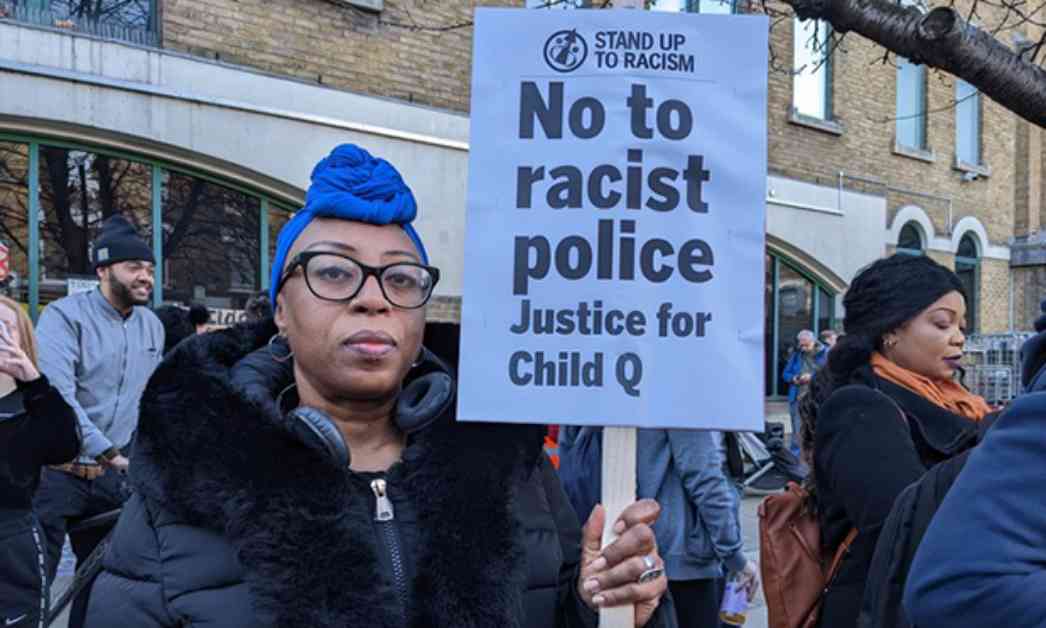The Child Q scandal that rocked Hackney four years ago is still reverberating through the community, sparking protests and calls for change. The incident, which involved the wrongful accusation and strip-searching of a Black 15-year-old girl at her school, highlighted serious concerns about the conduct of police officers in schools. In response to this, the role of Safer Schools Officers (SSOs) is set to undergo a major overhaul in an effort to prevent similar incidents from occurring in the future.
Background and Timeline of Events
The Child Q scandal occurred on December 3, 2020, when the young girl was falsely accused of drug possession and subjected to a strip search at her school in Hackney. This incident sparked outrage and protests in the community, leading to a reevaluation of the role of police officers in schools. Safer Schools Officers, also known as SSOs, were originally introduced in 2002 as part of Safer Schools Partnerships (SSPs) in response to concerns about discipline, behavior, and safety in and around schools.
Proposed Changes and Reforms
The proposed changes to the role of SSOs aim to shift their focus towards strategic and tactical advising, rather than getting involved in non-criminal or minor criminal issues that could disproportionately impact young people, especially those from marginalized communities. The Metropolitan Police’s new safety plans will be adopted by Hackney schools, with SSOs now being tasked with serious safeguarding, crime prevention, and ensuring the safety of children on their routes to and from school.
At a meeting of the Children and Young Person’s Scrutiny Commission, DCS James Conway acknowledged that the existing SSPs had become outdated and confusing, leading to incidents like the Child Q scandal. Conway emphasized the need to “stop and start again” to ensure clarity and effectiveness in the role of police officers in schools. The report presented at the meeting highlighted that there had been no “More Thorough Intimate Parts (MTIP) searches” in the borough since the Child Q incident, indicating a positive step towards preventing similar violations of students’ rights.
Response and Reactions
Independent Child Safeguarding Commissioner Jim Gamble welcomed the proposed reforms, emphasizing the importance of the role of SSOs in diverting children from the criminal justice system. Gamble’s previous report on the Child Q incident identified racism and an ‘adultification’ bias as influencing factors, leading to the wrongful strip-search of the young girl. Richard Brown, executive head of New Regent’s College, expressed optimism about the changes and noted the progress his school’s partnership had made since the scandal.
In response to questions about SSO training and youth engagement, Conway assured that the Metropolitan Police was reevaluating SSO training and actively engaging with groups like Young Hackney to ensure the new model was effective and inclusive. Gamble stressed the importance of engaging with children and young people to understand their perspectives and expectations, emphasizing the need for SSOs to act as a bridge between law enforcement and the community. The safeguarding group committed to reviewing various issues to ensure that young people’s interests were prioritized in policy changes moving forward.
The Independent Office for Police Conduct (IOPC) called for a review of police strip search powers following the Child Q investigation, highlighting the need for accountability and oversight in such incidents. The three officers involved in the scandal are facing disciplinary hearings for gross misconduct and allegations of discrimination, underscoring the seriousness of the violations that occurred. As of August 2024, the hearing date is still pending, indicating ongoing efforts to hold those responsible accountable for their actions.
In conclusion, the Child Q scandal in Hackney has prompted significant reforms in the role of police officers in schools, with a focus on safeguarding, crime prevention, and community engagement. The proposed changes aim to prevent similar incidents from occurring in the future and ensure that schools remain safe spaces for all students. By addressing the root causes of such incidents and prioritizing the voices of children and young people, Hackney is taking proactive steps towards building a safer and more inclusive educational environment.












